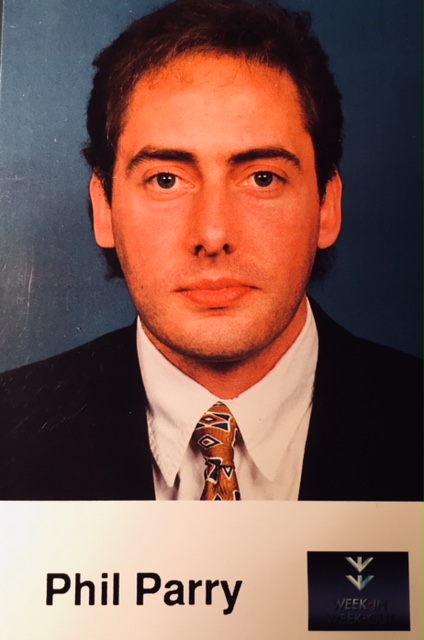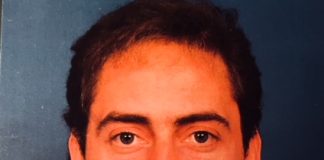- Not acting the part - 24th February 2026
- Death wish - 23rd February 2026
- Return to sender - 20th February 2026
 After 23 years with the BBC, and 38 years in journalism, here our Editor Phil Parry looks at how the man running Wales’ largest broadcaster received a 40 per cent pay rise, taking his salary to £260,000 a year, even though his organisation mistook a well-known tourist attraction for a mosque, one of his senior executives conducted a controversial affair with a married presenter, and his radio service secured record-breaking low audience figures.
After 23 years with the BBC, and 38 years in journalism, here our Editor Phil Parry looks at how the man running Wales’ largest broadcaster received a 40 per cent pay rise, taking his salary to £260,000 a year, even though his organisation mistook a well-known tourist attraction for a mosque, one of his senior executives conducted a controversial affair with a married presenter, and his radio service secured record-breaking low audience figures.

Earlier he described how he was assisted in breaking into the South Wales Echo office car when he was a cub reporter, recalled his early career as a journalist, the importance of experience in the job, and made clear that the ‘calls’ to emergency services as well as court cases are central to any media operation.
He has also explored how poorly paid most journalism is when trainee reporters had to live in squalid flats, the vital role of expenses, and about one of his most important stories on the now-scrapped 53 year-old BBC Wales TV Current Affairs series, Week In Week Out (WIWO), which won an award even after it was axed, long after his career really took off.

Phil has explained too how crucial it is actually to speak to people, the virtue of speed as well as accuracy, why knowledge of ‘history’ is vital, how certain material was removed from TV Current Affairs programmes when secret cameras had to be used, and some of those he has interviewed.
He has disclosed as well why investigative journalism is needed now more than ever although others have different opinions, how the pandemic played havoc with media schedules, and the importance of the hugely lower average age of some political leaders compared with when he started reporting.
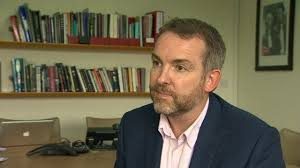
The phrase “rewarding failure” has never seemed more appropriate.
The man in charge of Wales’ biggest broadcaster, Rhodri Talfan Davies, received a 40 per cent pay rise after he was promoted to become Director of Nations taking his annual salary to £260,000. He also has additional responsibilities as Director of BBC Cymru Wales (BBC CW).
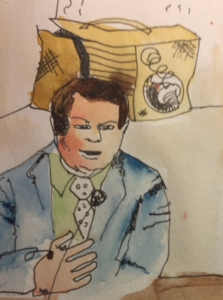 This comes despite the fact that his flagship evening television news programme mistook Brighton Pavilion for a mosque, the presenter of that transmission conducted a headline-grabbing affair with his executive Colin Paterson (the Editor of BBC Cymru Radio Wales [RW]), even though a show she fronted had been commissioned by his officials, and his listening figures are on the floor.
This comes despite the fact that his flagship evening television news programme mistook Brighton Pavilion for a mosque, the presenter of that transmission conducted a headline-grabbing affair with his executive Colin Paterson (the Editor of BBC Cymru Radio Wales [RW]), even though a show she fronted had been commissioned by his officials, and his listening figures are on the floor.
The scandal over this huge pay packet (although not the background) was reported in The Times, and what makes it worse is that this money comes from the licence-fee payer!
The backdrop for this news is also worrying for the BBC, when it is under fire from the new UK Culture Secretary Nadine Dorries.
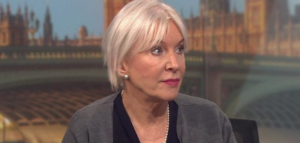
She has suggested the corporation may not even exist in 10 years time, as Ms Dorries condemns its “elitist” approach and “lack of impartiality”.
“It’s a very competitive environment at the moment”, she said at a fringe event in the Conservative Party conference, “You’ve got Amazon Prime, Netflix (and others)”.
But, along with the woman who appeared in ‘I’m a celebrity…get me out of here!’, the woman who took over the day-to-day running of BBC CW from Mr Davies, Rhuanedd Richards (a former Chief Executive of Welsh nationalist party Plaid Cymru [PC]), has an interesting background as well, which includes trumpeting the ‘success’ of the broadcaster and exhorting it to greater heights, while using vacuous ‘business-speak’.
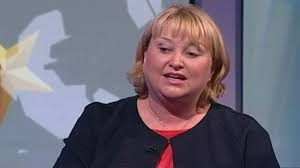
She has said: “We must make more impact and become more relevant to more people rather than super-serving the same people”, and “we know we can do even more to deliver for Welsh audiences – it’s what they demand of us – as we continue to ensure our content is relevant for all and in every part of Wales in a world of competing voices”.
This means precisely NOTHING!

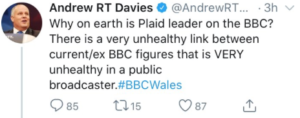 She was also for four years, a special adviser to former deputy first minister and PC leader at the time Ieuan Wyn Jones.
She was also for four years, a special adviser to former deputy first minister and PC leader at the time Ieuan Wyn Jones.
These apparent links to PC have been queried at an extremely high-level.
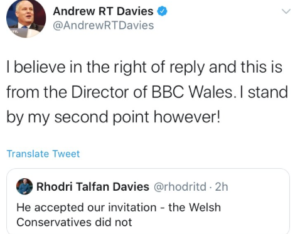 An extraordinary political row developed with the leader of the Conservatives in the Welsh Parliament/Senedd Cymru (WP/SC), when he accused on social media BBC CW, of a “link” with the nationalist party, and that it was “unhealthy”.
An extraordinary political row developed with the leader of the Conservatives in the Welsh Parliament/Senedd Cymru (WP/SC), when he accused on social media BBC CW, of a “link” with the nationalist party, and that it was “unhealthy”.
But in a highly unusual move, Mr Davies used Twitter to defend a decision to ask the PC leader on to a programme discussing major events, saying the Welsh Conservatives had not accepted the invitation.
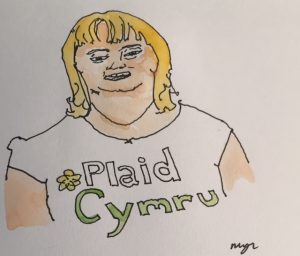 Yet in another tweet former Welsh Conservative leader in the WP Andrew RT Davies MS responded by saying he stood by his original point.
Yet in another tweet former Welsh Conservative leader in the WP Andrew RT Davies MS responded by saying he stood by his original point.
The astonishing spat over alleged links between PC and BBC CW came hard on the heels of growing concern about figures who have joined the corporation from PC, and those that have moved in the other direction.
However it would seem that both executives (Ms Richards and Mr Davies) face further challenges at BBC CW, although perhaps Mr Davies is in pole position.
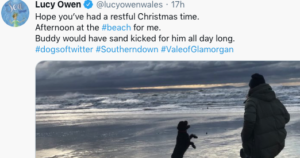 His senior lieutenant, Mr Paterson, carried on a contentious liaison with the presenter Lucy Owen even though it represented a huge potential conflict of interest because his officials had commissioned a RW programme hosted by her, called ‘Sunday morning with Lucy Owen’.
His senior lieutenant, Mr Paterson, carried on a contentious liaison with the presenter Lucy Owen even though it represented a huge potential conflict of interest because his officials had commissioned a RW programme hosted by her, called ‘Sunday morning with Lucy Owen’.
She also tweeted over Christmas about how she had taken a trip to the beach at Southerndown in the Vale of Glamorgan, yet travel advice from South Wales Police (SWP) at the time warned people against going to beaches, saying: “you shouldn’t be driving to these places”. The Welsh Government (WG) rules, then, also appeared clear: “If you are travelling away from home, you should travel to meet your Christmas bubble and return home in the course of 25 December”.

 When Mrs Owen made her comment on Twitter, the website ‘Visit the Vale’ had stated: “Wales is now in Tier 4 lockdown. This means that you should not travel to the coast for exercise purposes unless you end your journey on foot… We know it’s difficult, and asking you to stay away is very hard to do…”, with a link to the Welsh Government (WG) site about the rules.
When Mrs Owen made her comment on Twitter, the website ‘Visit the Vale’ had stated: “Wales is now in Tier 4 lockdown. This means that you should not travel to the coast for exercise purposes unless you end your journey on foot… We know it’s difficult, and asking you to stay away is very hard to do…”, with a link to the Welsh Government (WG) site about the rules.
When she was presenting WT, programme-makers used a picture of Brighton Pavilion during coverage of the start of the hugely important Muslim month of Ramadan instead of a mosque, and the mistake was then featured in the Brighton Argus.
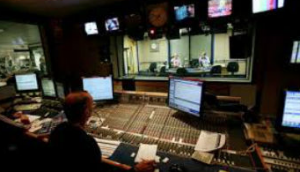
One Twitter user complained: “BBC Wales showing a picture of the Brighton Pavilion and getting it confused for a mosque when talking about Ramadan is kind of f****d?”. Another wrote furiously: “Not happy they’ve used a shot of Brighton Pavilion as though it’s a mosque (presumably)”.
Meanwhile, her overall superior (Mr Davies), has emphasised the importance of local radio, saying how ‘up to’ six peak time local services will launch, and has underlined the crucial role of the local radio ‘Make a Difference’ campaign as well as the vital nature of local news.

He has declared: “Right now, the BBC’s 6.30pm regional news on BBC One is the biggest show on most weeknights in Britain with more than six million viewers across the UK tuning in”. He added: “The simple truth is that our local and regional services have never mattered more to audiences. Millions of people each day turn to our local output for information they can trust about the communities they love. …We’ll be launching up to six new peak-time BBC local radio services in communities where we know we need to do more – including Bradford, Sunderland and Wolverhampton. And we’ll provide on-demand bulletins on BBC Sounds that are tailored to where you live”.
 But maybe people need their memories jogged about Mr Davies’ own record. The story by The Eye about his key executive, Mr Paterson, having an affair with one of his presenters (Mrs Owen) was included in a Digital Spy (DS) comment with the message above the link saying “…the record low listening figures at Radio Wales under it’s (sic) current management (were) amplified this year by criticism from former award winning reporters and presenters”.
But maybe people need their memories jogged about Mr Davies’ own record. The story by The Eye about his key executive, Mr Paterson, having an affair with one of his presenters (Mrs Owen) was included in a Digital Spy (DS) comment with the message above the link saying “…the record low listening figures at Radio Wales under it’s (sic) current management (were) amplified this year by criticism from former award winning reporters and presenters”.
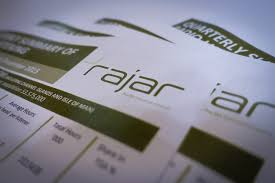
Apart from the affair, the work performance of Mr Davies’ appointee, Mr Paterson, at RW (Wales’ only national English-language radio station), has also been open to question, as the DS contributors have alluded to. A recent RAJAR report on listening figures, made grim reading for them both as well as Ms Richards, coming soon after other low audience statistics.
In 2020 the figures revealed a slight increase on 2019 but a substantial drop compared with two years earlier, a massive decline on the year before that, and how more than 40,000 listeners had been lost in one three month period, despite a huge amount of money being spent on new schedules. They also showed that the total listening hours were 2,667,000, down from 3,074,000 in September 2019 (although up from 2,147,000 in December 2018) and the market share was just 5.5 per cent.

After these numbers were published, a prominent personality described online as one of the main presenters at RW during its launch, renewed his call for Mr Paterson and his superior, Mr Davies, to resign.
Mike Flynn told The Eye exclusively: “Both of these so called media executives (Mr Davies and Mr Paterson) are answerable to the public who pay their salaries via the licence fee and should resign. But they are frightened to reveal the audience for the abysmal Claire Summers programme that replaced Good Morning Wales (GMW). I would like to know what the real figures are across daytimes and weekends and how they waste over £18 million. It is about time they started to answer a few questions.”

Mr Flynn was equally unimpressed by The Eye’s revelation of Mr Paterson’s affair with Mrs Owen. He told the website: “If Paterson has been having an affair with a Wales Today and Radio Wales presenter it brings his management skills in to question and he needs to be suspended immediately”.
But it is promotion, not suspension, that appears to be the order of the day, after Mr Davies was named Director of Nations to take his pay to £260,000, even though his organisation in Wales mistook a well-known tourist attraction for a mosque, one of his senior executives conducted a controversial affair with a married presenter amid accusations of it being a conflict of interest, and his radio service secured record-breaking low audience figures…
The memories of Phil’s astonishing decades long award-winning career in journalism (including his 23 years at the BBC) as he was gripped by the rare neurological disabling condition Hereditary Spastic Paraplegia (HSP), have been released in the important book ‘A GOOD STORY’. Order the book now!
Regrettably publication of another book, however, was refused, because it was to have included names.








